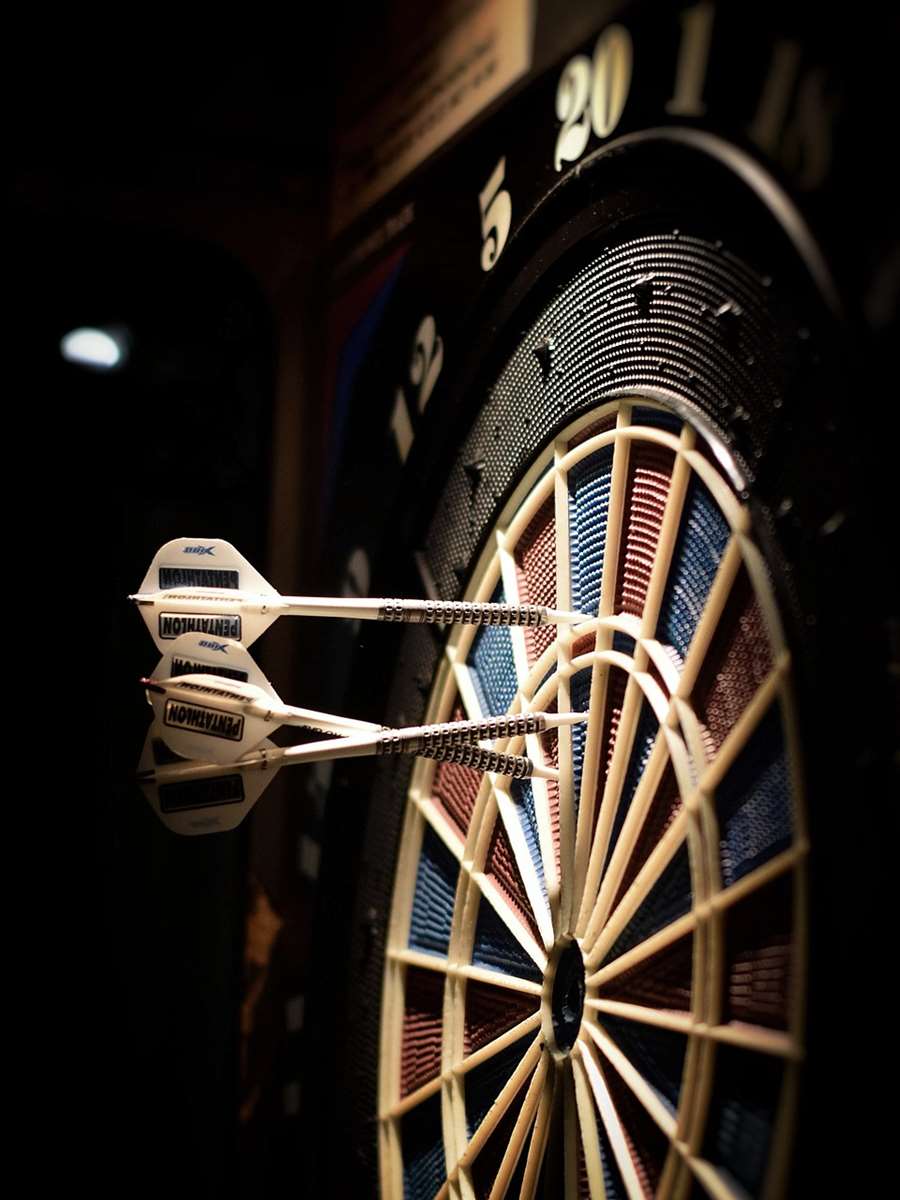Understanding what constitutes unsportsmanlike conduct in darts, whether you’re using steel tip or soft tip darts, is crucial for maintaining a respectful and enjoyable environment. This article explores various scenarios of unacceptable behavior, the consequences of such actions, and strategies for promoting good sportsmanship during dart games. We’ll cover everything from deliberate distractions and verbal abuse to cheating accusations and respect for equipment, offering practical advice to ensure fair and enjoyable gameplay for everyone.
⚠️ Still Using Pen & Paper (or a Chalkboard)?! ⚠️
Step into the future! The Dart Counter App handles all the scoring, suggests checkouts, and tracks your stats automatically. It's easier than you think!
Try the Smart Dart Counter App FREE!Ready for an upgrade? Click above!
Defining Unsportsmanlike Conduct Steel Soft Tip: A Comprehensive Overview
Unsportsmanlike conduct in any sport detracts from the spirit of the game, and darts, with its emphasis on precision and mental fortitude, is no exception. When considering unsportsmanlike conduct steel soft tip, it’s important to recognize that the type of dart being used doesn’t excuse or mitigate bad behavior. Both steel tip and soft tip games require players to uphold the same standards of respect, fairness, and integrity.
So, what exactly falls under the umbrella of unsportsmanlike conduct in a dart game? Here’s a breakdown of some common examples:
- Deliberate Distractions: Intentionally trying to throw off an opponent’s focus, whether through noise, movement, or other disruptive tactics, is unacceptable.
- Verbal Abuse or Taunting: Insulting, mocking, or intimidating an opponent constitutes a serious breach of sportsmanship.
- Cheating: This can take many forms, such as misreporting scores, moving darts after they’ve landed, or tampering with the board. Learn Basic Darts Fundamentals for Beginners to prevent unintentional misunderstandings.
- Damage to Equipment: Intentionally damaging or mistreating the dartboard, darts, or other equipment is disrespectful and unsportsmanlike.
- Excessive Celebration: While celebrating a good throw is natural, excessive or arrogant displays that are intended to demean an opponent are inappropriate.

It is crucial to maintain a positive and respectful atmosphere, irrespective of the game’s intensity or the stakes involved. Remember, darts is meant to be an enjoyable pastime, and good sportsmanship is essential for preserving that enjoyment for everyone.
Specific Examples of Unsportsmanlike Behavior in Darts
To further clarify what constitutes unsportsmanlike conduct, let’s examine some specific examples in greater detail. These scenarios apply to both steel tip and soft tip darts, emphasizing that ethical behavior transcends equipment choice.
Deliberate Distractions
Distracting an opponent is a common form of unsportsmanlike conduct. Examples include:
- Making Excessive Noise: Talking loudly, shouting, or making other disruptive noises while an opponent is throwing.
- Moving or Shaking the Board: Intentionally disturbing the board to affect an opponent’s throw.
- Staring or Intimidating: Using prolonged eye contact or aggressive body language to unnerve an opponent.
- Walking in Their Line of Sight: Moving directly in front of an opponent while they’re focusing on the board.
Even seemingly minor actions, like repeatedly clearing your throat or tapping your foot, can be perceived as deliberate distractions if they are done intentionally to disrupt an opponent’s concentration.
Verbal Abuse and Taunting
Words can be just as harmful as actions. Verbal abuse and taunting are clear examples of unsportsmanlike conduct. This includes:
- Insulting an Opponent: Using derogatory language to attack an opponent’s character or skill.
- Mocking Their Throws: Making fun of an opponent’s technique or accuracy.
- Boasting Excessively: Rubbing victories in an opponent’s face in a disrespectful manner.
- Using Profanity: Directing swear words towards an opponent or the overall situation in a way that is meant to intimidate.
Constructive criticism is acceptable when offered respectfully and with the intention of helping an opponent improve. However, any form of verbal attack or taunting is unacceptable.

Cheating and Score Manipulation
Cheating is perhaps the most egregious form of unsportsmanlike conduct. It undermines the integrity of the game and disrespects all players involved. Common examples include:
- Misreporting Scores: Falsely claiming a higher score than what was actually achieved.
- Moving Darts: Adjusting the position of darts after they’ve landed to improve the score.
- Tampering with the Board: Altering the dartboard in any way to gain an unfair advantage.
- Using Illegal Darts: Employing darts that do not conform to the rules of the game, such as exceeding weight limitations.
Accusations of cheating should be handled with care and respect. If you suspect foul play, it’s best to address the issue privately with the player involved or, if necessary, with a tournament official.
Disrespect for Equipment
While it might seem minor, showing disrespect for equipment is another form of unsportsmanlike conduct. This includes:
- Throwing Darts in Anger: Launching darts at the board with excessive force after a poor throw.
- Damaging the Dartboard: Intentionally damaging the board through rough play or vandalism.
- Stealing or Misusing Darts: Taking another player’s darts without permission or damaging them through improper use.
- Not Maintaining Darts Properly: Allowing darts to become damaged and then blaming misses on the condition of the darts rather than skills.
Treating equipment with respect shows consideration for the game and for other players. Proper maintenance and care are essential for ensuring a fair and enjoyable experience for everyone.
Consequences of Unsportsmanlike Conduct
The consequences of unsportsmanlike conduct steel soft tip can range from minor warnings to serious penalties, depending on the severity of the offense and the context of the game. Consequences are crucial for setting a standard.
- Warnings: A verbal warning is often the first step for minor offenses.
- Point Deductions: In competitive matches, players may face point deductions for repeated or more serious instances of unsportsmanlike conduct.
- Game Forfeiture: Extreme cases may result in the forfeiture of the game.
- Suspension: In organized leagues or tournaments, players may be suspended from future competitions for severe or repeated offenses.
- Banning: The most extreme consequence is a permanent ban from leagues or tournaments.

Beyond these formal consequences, unsportsmanlike conduct can also damage a player’s reputation and relationships with other players. Maintaining a positive and respectful attitude is essential for fostering a healthy and enjoyable darting community. You can even look at fun dart game variations with modified rules to change the competitive environment.
Promoting Good Sportsmanship in Darts
The best way to prevent unsportsmanlike conduct is to promote good sportsmanship from the outset. Here are some strategies for creating a positive and respectful environment:
- Set Clear Expectations: Establish clear rules and guidelines for behavior before the game begins.
- Lead by Example: Demonstrate good sportsmanship yourself, even when facing adversity.
- Respect Your Opponent: Treat your opponent with courtesy and respect, regardless of their skill level.
- Focus on Self-Improvement: Concentrate on improving your own game rather than criticizing or belittling your opponent.
- Acknowledge Good Plays: Recognize and praise your opponent’s good throws, even when they benefit them.
- Control Your Emotions: Avoid letting anger or frustration get the best of you.
- Learn the Rules: Ensure you and your opponent have a solid understanding of the official game rules. This can prevent misunderstandings that can lead to disputes.
Good sportsmanship not only makes the game more enjoyable but also fosters a sense of community and camaraderie among players. Remember, darts is a game of skill and strategy, but it’s also an opportunity to build relationships and have fun.
Dealing with Accusations of Unsportsmanlike Conduct
If you are accused of unsportsmanlike conduct, it’s essential to respond calmly and respectfully. Here’s how to handle such situations:
- Listen Attentively: Allow the accuser to fully explain their concerns without interruption.
- Remain Calm: Avoid becoming defensive or argumentative.
- Acknowledge the Accusation: Even if you disagree with the accusation, acknowledge that the other person feels wronged.
- Offer an Explanation: Explain your perspective on the situation, but avoid making excuses.
- Apologize if Necessary: If you realize that you unintentionally offended or upset someone, offer a sincere apology.
- Seek Mediation: If you cannot resolve the issue on your own, seek mediation from a neutral third party, such as a tournament official.

Remember, the goal is to resolve the conflict peacefully and constructively. Maintaining a respectful and open dialogue is crucial for finding a mutually acceptable solution.
Steel Tip vs. Soft Tip: Does the Dart Type Matter for Sportsmanship?
As we’ve repeatedly emphasized, the type of dart – steel tip or soft tip – is irrelevant when it comes to sportsmanship. The principles of respect, fairness, and integrity apply equally to both forms of the game. While there may be some differences in the specific rules and etiquette of steel tip and soft tip darts, the core values of good sportsmanship remain the same.
Some might argue that soft tip darts, often played in more casual settings, might be more prone to lax enforcement of sportsmanship rules. However, this is not necessarily the case. Regardless of the setting, players should always strive to uphold the highest standards of ethical behavior.
Ultimately, sportsmanship is a matter of personal responsibility. Whether you’re playing steel tip or soft tip darts, it’s up to you to conduct yourself with respect, fairness, and integrity.

The Long Game: Why Sportsmanship Matters
Unsportsmanlike conduct steel soft tip can have short-term gains, but those gains are always overshadowed by the damage done to your reputation and the overall darting community. Embracing good sportsmanship fosters a more welcoming and enjoyable environment for everyone, attracting new players and retaining seasoned veterans. Over time, a reputation for fairness and respect will earn you more admiration than any number of victories achieved through questionable means. Remember that you can make how to make darts fairer with handicap rules for new or casual players to get involved.
Conclusion
In conclusion, understanding and preventing unsportsmanlike conduct steel soft tip is crucial for maintaining a positive and respectful darting community. By adhering to the principles of respect, fairness, and integrity, we can ensure that darts remains an enjoyable and rewarding experience for all. Remember to prioritize good sportsmanship, respect your opponents, and uphold the rules of the game. Let’s create a darting world where fair play and camaraderie reign supreme.
Ready to put your newfound knowledge into practice? Find a local dart league or gather some friends for a friendly game, and remember to always prioritize sportsmanship. By fostering a culture of respect and fairness, we can ensure that darts remains a beloved pastime for generations to come.
Hi, I’m Dieter, and I created Dartcounter (Dartcounterapp.com). My motivation wasn’t being a darts expert – quite the opposite! When I first started playing, I loved the game but found keeping accurate scores and tracking stats difficult and distracting.
I figured I couldn’t be the only one struggling with this. So, I decided to build a solution: an easy-to-use application that everyone, no matter their experience level, could use to manage scoring effortlessly.
My goal for Dartcounter was simple: let the app handle the numbers – the scoring, the averages, the stats, even checkout suggestions – so players could focus purely on their throw and enjoying the game. It began as a way to solve my own beginner’s problem, and I’m thrilled it has grown into a helpful tool for the wider darts community.